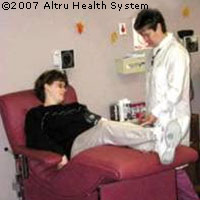Researchers use enzymes to produce universal blood
A team of Danish, French, Swedish and American researchers says it has uncovered two enzymes capable of converting blood types A, B and AB to O, the 'universal' blood used in transfusions. Their method, details of which are published in Nature Biotechnology, could be the answer to dwindling blood supplies in hospitals. ABO blood types are defined by the presence or absence of two sugar antigens on the surface of the red blood cells. Group A has one sugar called galactosamine, group B has the sugar galactose, group AB has both, while group O lacks both A and B antigens. Because of these antigens, mixing different blood groups can cause immune reactions where blood cells clump together in the blood vessels, resulting in potentially fatal outcomes. Until now, group A red cells could only be given safely people to A and AB blood types, and group B red cells to B and AB blood types. Group O red cells, however, are suitable for transfusion to individuals of all ABO groups because of the absence of the A and B antigens. More than 25 years ago, attempts were made using enzymes to remove the A and B antigens to develop universal blood cells. While researchers were successful in converting B red blood cells into O cells, the conversion from A cells failed and the process, which required an abundance of enzymes, proved too costly. Following the screening of some 2,500 fungal and bacterial isolates for more suitable enzymes, researchers now say they have designed a novel glycosidase derived from Elizabethkingia meningosepticum and Bacteroides fragilis. The glycosidase is capable of rendering both A and B blood cells transferable to any donor recipient. Clinical trials are underway, and the team of researchers is confident of being able to demonstrate that the enzyme-converted O cells are safe for transfusion. If the process can be made cost-effective, this breakthrough could help dramatically increase blood bank stocks.
Countries
Denmark, France, Sweden, United States



